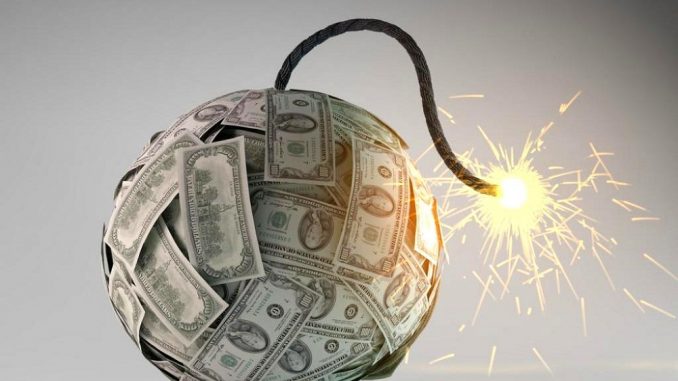EE.UU. – China: The truce does not remove the prospect of a new peak in the crisis of the world economy
The focus was placed by specialists and institutions[1] in US trade war. he told China. The debate that arises from there reaches, at most, locate a center in the dispute for supremacy on new technologies. then passes geopolitical issues[2], but just flies over the real economic causes. Nevertheless, those same experts predict a next crisis is in sight. And hold, although at the meeting on 29 June between Trump and Xi Jimping as part of the G20 in Japan has achieved a truce. Some of them as Nouriel Roubini, which she had its prime time for having predicted the crash of 2008, Coming from September 2018[3] putting the new bankruptcy date in the year 2020.
These specialists do not understand why, If the US economy was going well according to them, Trump was launched against China, even harming its own economy. In the background is hidden assertion that these experts, including some Marxists, They identified the crisis 2008 with the great recession that lasted between that year and the 2009. And once the financial market showed a relatively sustained reaction had terminated the.
However analyzing the real economy, It is a fact that this has not recovered since the outbreak of this crisis. Not recognizing this decade Long Depression, as we noted in August 2018[4] comparison has only two historical periods of modern capitalist development, periods resulted in the two world wars of the twentieth century. Why the truce in US trade war against China is momentary. And it will be open at any time what US demands China make this, simply, you can not do without collapsing[5].
Then beyond that financial markets, ie shares, bonds and combinations and derivatives thereof, respond with relative optimism, the current trend towards a slowdown in economic growth and the prospect, relatively short time, of a new recession or peak of the global crisis will not go away. The key, as usual, It is in the evolution of the real economy, productive.
Productivity slowdown, decline in productive investment and falling rate of profit
One of the main debates among heterodox economists, the neo-liberals and Marxists is about the reason causing the slowdown in labor productivity in major economies. Beyond disagreements over whether this slowdown is secular, ie if it has been developing for more or less 50 years, They recognize all that has been occurring at least in recent 15 years. Productivity is one of the main components that explain the real GDP, the other is employment growth. This means that the real GDP growth can be measured by two components: the growth of labor productivity and employment growth. And it is here where the reasons for all the economic turmoil of the period Long
Depression facing the world economy since the Great Recession 2008
The productivity of the major advanced economies excluding China, It decelerates next year since its recovery in the 90s of last century, when he recovered after a fall from the 70, by the application of information technology. Then it was 2,3% annually in 11 major world economies and today has been reduced to 0,7% average. Taking cases like Russia and Italy to decrease and the UK who barely moves above zero. The data, that come from a study of more than 50 years by JPMorgan economists cited by Michael Roberts in his blog[6], They emphasize that as your model, the trend is that this slowdown continues to deepen.
This fall or slowdown is mainly explained by the decline in investment in productive assets tech. The same study shows that investment has behaved downward in recent 50 years. And this is not surprising since the downward curve follows the same path that the average profit rate system. Ie at a lower rate of profit less investment in technology and fixed assets. The other factor that explains the real GDP, the evolution of the workforce, He also suffered a sharp slowdown going to provide the 1,7 the percentage of growth in productivity 0,5.
But if you do not increase the hours worked, ie if the workforce is reduced which is that productivity could grow is investment in fixed capital but as we saw above this is not happening. This situation in the real economy is one factor that explains the long depression that takes another ten years.
On the basis of this process is the fall of capitalist profits in the real economy. In a recent study, part of its preparation for the Working Group CLACSO: Crisis and World Economy, Chilean economist Orlando Caputo Marxist presents the evolution of the benefits of the main branches in the US economy.
He says there that profits have fallen between 2014 and late 2018 in the following manner[7]: for the industry that produces Machinery went from 36,3 billions of dollars in the fourth quarter of 2014 a 18,3 thousands of million dollars in the fourth quarter of 2018. In the production of computers and electronic products decreased profits of 70,9 a 39,3 thousands of million between the second quarter of 2015 and the fourth quarter of 2018. In the automotive industry, decrease in profits 36,4 billions of dollars in the fourth quarter of 2014 a 8,9 billions of dollars in the fourth quarter of 2018. quoted Michael Roberts, confirmed in an article 14 of July, the same trend for the first two quarters of 2019[8].
These observations on corporate profitability as measured by corporate profits in relation to the balance of assets has not recovered levels 2008, in fact return on equity is below levels of the late 90s. This was pointed out in the report of IMF Global Stability, April 2019.[9]
So the reasons they do anticipate a new recession lie in productivity and productive investment in decline, a workforce that does not grow, this fueled by the continuation of the trend to the falling rate of profit.
Debt and growth of fictitious capital ...
In its latest reports the IMF has been pointing out the growing danger of a new debt crisis was provoked. Cristin Lagarde said at the G20 meeting in Japan, shortly before being named president of the European Central Bank, the US debt could return unsustainable. The truth is that since 2018 several major emerging economies are in recession calls or very close to it[10] compromising the sustainability of sovereign debt.
Meanwhile growing debt level of some of the corporations, and increases the number of so-called zombie companies. While also debt of citizens, household is returning to levels similar to those of 2007 before the outbreak of the crisis. In the same way that warned of sovereign debt, the IMF, also it has been pointing out since late last year a growing concern about the evolution of the debt of corporations. A report on the IMF blog in November that year has the suggestive title of sounding the alarm on leveraged loans[11] [12].
These loans accounted for when the report about 1.1 billions of dollars, representing twice that 2007 before the crisis. While the major investors in them is the so-called shadow banking, because it is regulated by central banks, sector where the crisis began in 2008. He 70% of these credits is in United States. And the major lenders are ordinary savers to 2007 They were encouraged to invest in subprime mortgages that triggered the crisis. That is, while the debt of citizens grows to boost consumption, their savings evaporate risk, because they are tied to the financial operations.
sovereign debt drowned States, Corporations using loans over their repayment possibilities for financial speculation and not for productive investment, indebted citizens and their savings committed, They are the explosive cocktail that explains the possibility of a debt crisis that can have the same consequences or above the crack of 2008.
The truce between the US and China does not resolve the weaknesses of the capitalist system today. Because basically it is found that, the key to economic functioning of capitalism lies in making profits in the real economy, and the rate of profit is not recovering. That and although each has a different trigger crises and the international recession 1974-5 It was triggered by a sharp rise in oil prices and the abandonment of the US. dollar-gold pattern.
Crisis 1980-1982 It was caused by a housing bubble in Europe and an industrial crisis in major economies. Recession 1990-2 It was caused by oil prices. Mild recession 2001 It was the result of the dot.com bubble burst. And the Great Recession began with the collapse of the housing bubble in the US. Always behind each downward movement is in productive capital gain and, Finally, a deceleration or reduced overall mass gains.
Carlos Carcione




